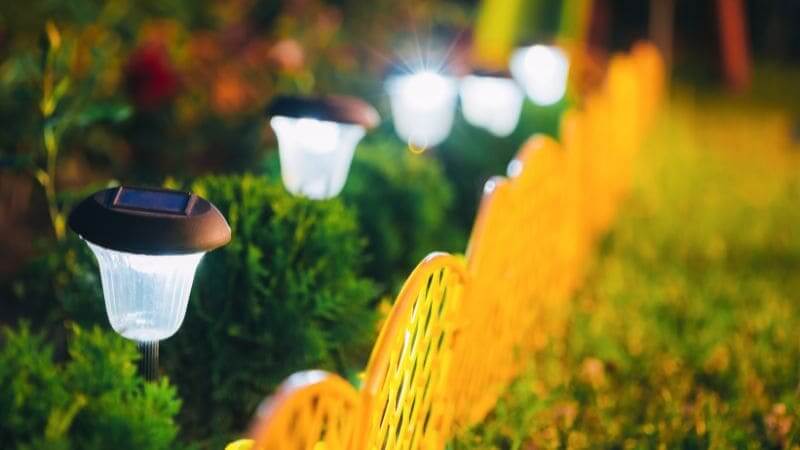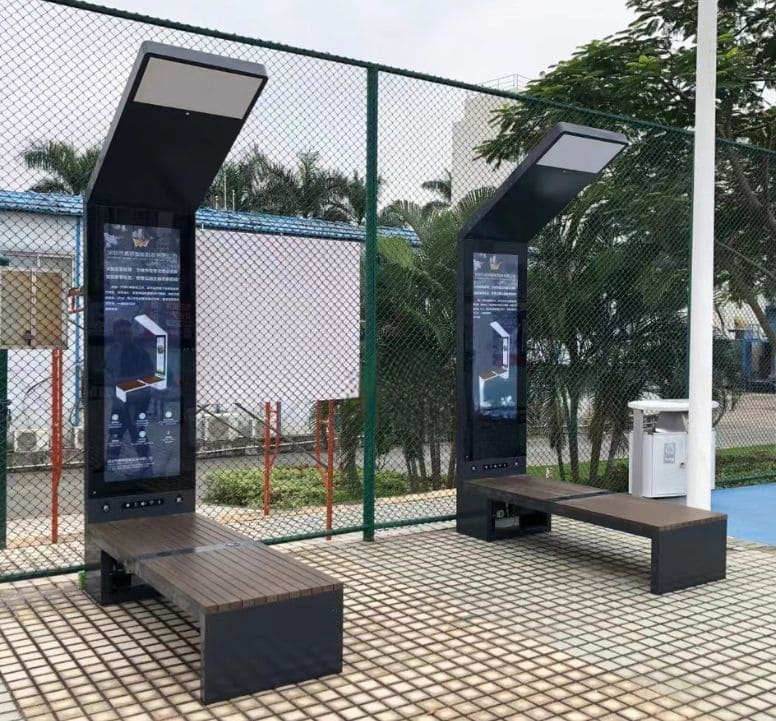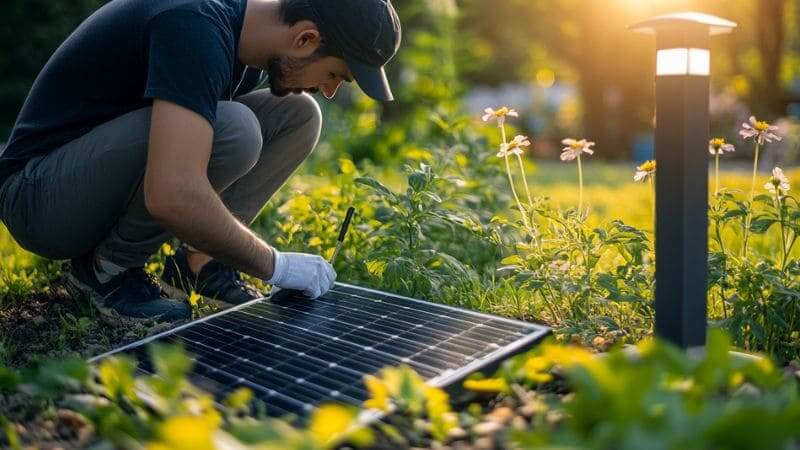It can be difficult to choice between solar and wired lighting for your home or business among a wide variety. With this misinformation, you may easily select lighting that is expensive, inefficient, or harmful to the environment.
Solar outdoor lighting is powered by sunlight, offering energy savings and environmental benefits, electric landscape light provides instant reliable illumination though without an energy savings measure which tends to be more expensive to use. They have their respective ups and downs and while one may be more for you; it might not sit right with another.
Which kind of outdoor landscape lighting is best for You? Read on for a full comparison and choices.
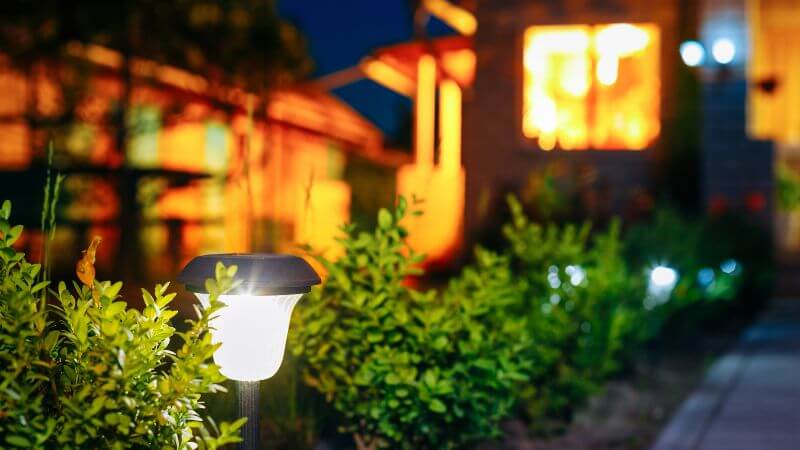
Outdoor Solar Lights Vs Wired Lights: How Do the Prices Compare?
Initial Costs
The primary barrier to more widespread use of solar lighting is the upfront cost, which can higher than traditional electric lighting because each light requires solar panels and rechargeable batteries. However, no wiring and trenching makes it an economical solution in the long run. In other words, you may not have to pay for electrical work every time you purchase individual solar powered landscape lighting fixtures. That’s makes it perfect for the do-it-yourself homeowner.
But then, Plug-in lighting might appear less costly initial due to lower fixture costs per light. The problem is that the overall installation costs can be much more once you add in the trenching, electrical wiring or hiring of a professional electrical work could soon add up to raise the total price.
Operational Costs
After installation, solar lighting has near-zero operating costs since the lights are powered by converting sunlight into electricity, which, in turn, powers the lights. This means you won’t receive a single electricity bill for that month, as no energy is taken from the grid. In the long term, particularly in sunny climates, this can result in substantial savings
On the other hand, electric outdoor lighting has access to your home power source for energy. While low-voltage lighting has been known to reduce the amount of electricity you use, these costs can quickly add up if you have a handful of lights running every night.
Obviously if a long-term solution is your main concern, solar lamp wins hands down. And in sunnier places, that means you can theoretically have all the consistent lighting you need for decades — or until it breaks down. Although expensive to start with you do not piss money up against the wall all year paying for energy.
Long-Term Savings
Obviously if a long-term solution is your main concern, solar landscpe light wins hands down. And in sunnier places, that means you can theoretically have all the consistent lighting you need for decades — or until it breaks down. Although expensive to start with you do not piss money up against the wall all year paying for energy.
Electric lighting: This kind of lighting will cost the leaseholder less cash in advance yet more five star due to being vitality effective. As such, it is the more expensive (economically) and not-as-eco-friendly choice compared to solar powered lights, which are less expensive in terms of overall cost and has a stronger green footprint.
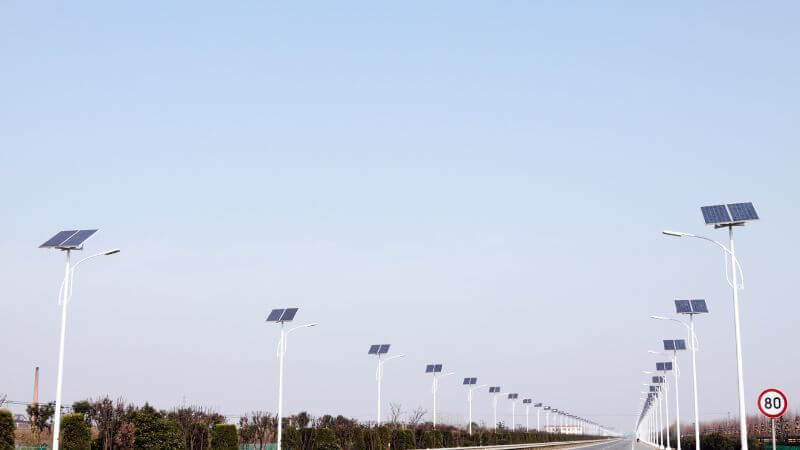
Solar Compare Wired Landscaping Lighting: The Right Choice For Your Home Exterior
Choosing between solar and electric lighting depends mostly on specific lighting ideas, some financial budget and where you are living. Homeowners who want to use an energy-efficient, low-maintenance solution may opt for solar landscape lighting. It works well in areas that receive ample sunlight, such as gardens and walkways. However,solar landscape lights are dependent on sunlight, meaning their performance can drop in shaded areas or during shorter daylight hours in winter.
Electric landscape lights offer a reliable solution, unaffected by weather conditions or sunlight availability, making them ideal for security purposes or larger landscape designs. They do need to be installed by a professional, which can be costly and time-consuming.
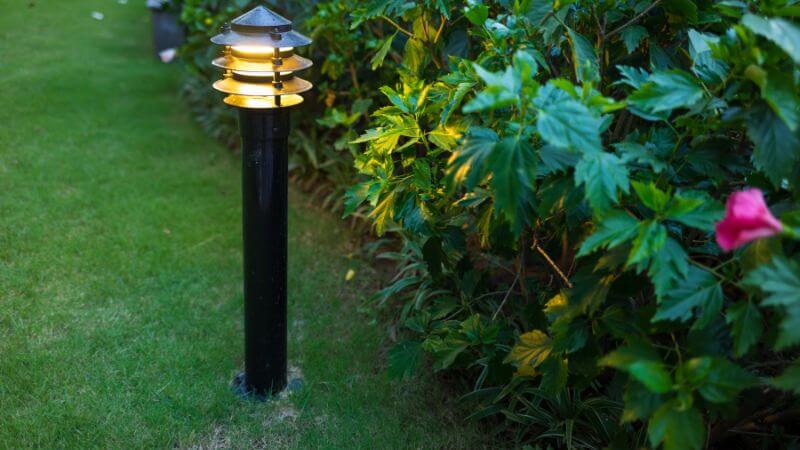
How Does Installation Differ?
Ease of Installation
Solar landscape lighting is known for being easy to install, with no need for complex wiring or professional help. Since each solar fixture has its own power source, you can easily place the lights wherever they are needed, making it a perfect DIY project for homeowners.
Electric lighting, on the other hand, requires wiring between fixtures and your home’s electrical system. This usually involves trenching to bury the wires and installing transformers for low-voltage systems. Due to the complexity, many homeowners need to hire an electrician, which adds to the installation cost and time.
Flexibility in Placement
Solar outside lights offer great flexibility in placement. You can almost put them anywhere in your yard as long as the outdoor space gets enough sunlight. They are perfect to use in isolated places around your property where you may be limited when it comes to wiring them up — or even getting the electricity there.
In contrast, Electric lighting is limited by the proximity of electrical connections. Proper power supply requires careful planning to design how all the fixtures will be connected. Electric lights must either be trenched or laid in conduit underground for protection, which limits their placement and can disrupt your carefully designed landscaping when the electrician installs the cables.
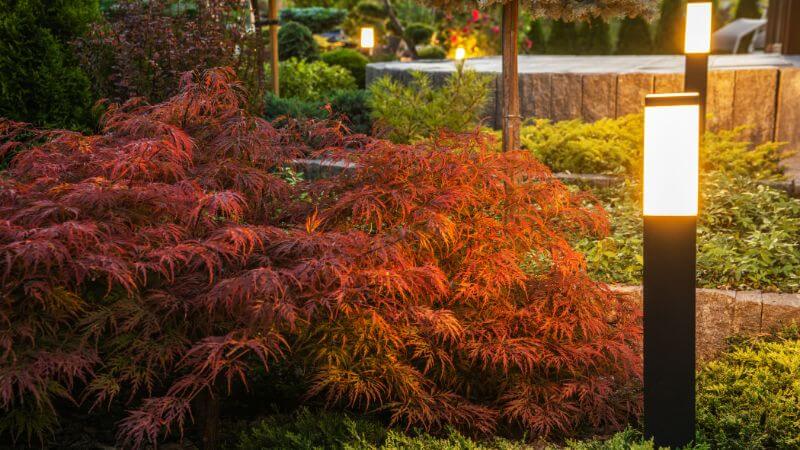
Solar Against Electric Lighting — What Maintenance?
Maintenance Needs
Solar lighting is low maintenance. The main tasks involve washing the solar panels to keep them effective at collecting sunlight and changing the batteries every few years. Sunlight panels can accumulate dust, reducing their charging efficiency, so regular cleaning is necessary, but without the use of chemicals or high-pressure water.
Electric landscape lights work require more frequent maintenance and tend to be higher maintenance compared to most low voltage alternatives. This typically involves replacing the LED components, inspecting the wires for damage, and ensuring all connections are intact. Wiring can deteriorate or corrode over time, especially around the system, leading to more frequent repairs.
Solar Compare with Electric Lighting — Control and Functionality
Control Options
As you can see, these are some of the features that come with solar exterior lights, allowing them to automatically turn on at dusk and off at dawn. In addition to that, some solar lamps are also equipped with motion sensors, making them useful not just as path lights but also for security purposes. However, there’s always a trade-off when it comes to control: electric lighting will inevitably be easier to control than wireless options.
This is where electric lighting really shines, offering more control options like dimmers, timers, and even integration with smart home systems. It provides more flexibility, allowing you to determine exactly when the lights come on, giving users a more customizable experience.
Reliability and Performance
When it comes to security, solar outdoor lights can’t always be relied on, especially when there’s no sunlight. They can be inconsistent, with weather conditions like cloudy days or seasons with limited sunshine affecting their performance.
On the other hand, electric lighting offers consistent and reliable light coverage no matter the weather or sunlight situation. That makes it a better option for areas where stability is key—like home security or lighting up parts of your property, even when you’re trying to deter pests like chicken-stealing predators.
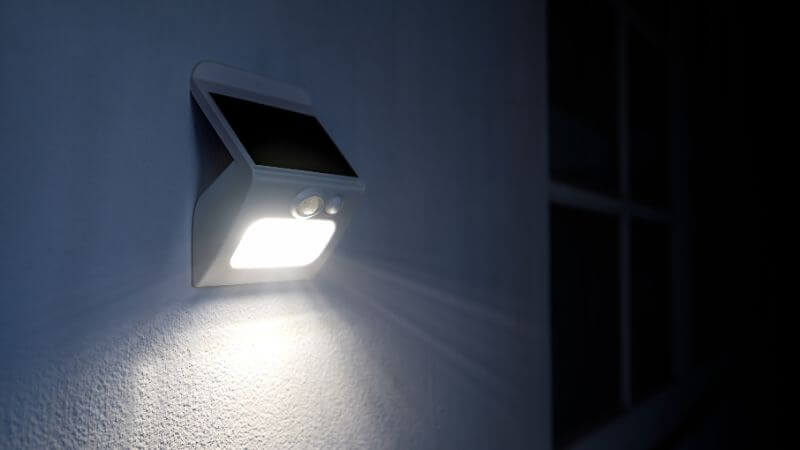
What Are the Security Benefits of Solar and Electric Outdoor Lighting?
Security Lighting
For inexpensive, eco-friendly security lighting, solar security lights are a great option. They’re perfect for hard-to-reach places where running electrical would be a challenge. If you have several dark corners in your yard or driveway, consider using motion-sensing solar lights—they’re a practical and affordable solution.
However, for brighter and more secure lighting, electric lighting is the better choice, especially in areas that need constant illumination. Electric lighting is ideal for home security, as it provides a brighter, more consistent light beam compared to solar-powered lights.
Emergency Backup
One major advantage of solar outdoor lights is that they operate independently of the grid. Even during a power outage, they will continue to work, making them useful as emergency lighting.
In contrast, electriclighting connected to the electrical grid won’t function during an outage unless it’s paired with a backup energy provider like a generator or battery system.
Solar and Electric Lighting: Curb Appeal
Aesthetic Considerations
When it comes to the aesthetic, both solar and electric lighting look nice, but there is a difference in how it appears. It comes in many contemporary designs and can fit into your setting with no topping as well. Since solar fixtures have no wires, their placement can be easily relocated or reconfigured when you modify your garden layout. Although one disadvantage of solar-powered landscape lighting is that it may not illuminate as brightly as electric lights, particularly in areas with few hours of sunlight each day.
In contrast, electric landscape lighting systems open up a more diverse range of configurations and more powerful fixtures — which can help to spread across large swaths or emphasize certain architectural aspects of your home. Electric lighting can generate more powerful light because it is able to take higher wattage LED lights, which comes in very handy when you plan on illuminating a pathway, trees or other features in your landscape.
The ability to Customize and Design your integrator
They are very easy to install and light on the pocket for repurposing around your property, which makes them a flexible option for people who like to tinker with their yard arrangement. You can relocate solar fixtures throughout the yard without having to worry about digging up cables or locating an open power supply. But the downside is that solar landscape lights have to be located where they can get sunshine through the day. They cannot be used in areas that are shaded or where some light during day time is restricted, especially during winters.
While spotted in, it enables higher control over brightness and what you need to light up. After installation you can try using timers, dimmers and for smart homes also direct integrations. If you are hoping to produce stark lighting effects, illuminate some points of interest in your landscape, or if there is enough open spaces that will see very little amount of sunlight this option works best. That said, because electric lighting systems are permanent, changing or adjusting them can be difficult and expensive.

What Is the Environmental Impact?
Sustainability
Of course, it is a matter of great pride that choose solar power lighting is an ecological solution.They use sunlight and therefore have a few undeniable advantages:
solar powered lights get 100% renewable energy from the sun. This also helps in lowering down your carbon footprints as these lights do not run on fossil fuels and reduced greenhouse gas emissions. Solar technology is a perfect option for eco-friendly homeowners, when it comes to sustainable alternative of lighting systems in place.
By contrast, electric lights are electrical which generally means that the electricity is coming from a variety of sources like coal or gas. Electric external lighting has a lower environmental impact, depending on your local power grid. And if your grid happens to be powered by fossil fuels, using electric lights could increase the carbon problem.
Energy Efficiency
Due to the fact solar lights are energy-efficient by nature, they only work on sunlight and do not use grid electricity. This makes them a great fit for people with the desire to lower their energy bills and environmental impact. Also, solar technology has become much more efficient where sunlight panels can now create more energy with less sunlight.
if you use electrical systems in your garden, you could opt for LED bulbs which use significantly less power than standard incandescent varieties.
Electric lights, even those that use highly efficient LED light fixtures, still add to your electricity usage in your home, grdually increasing your electric bills over time.
Lifespan & Durability: Solar Against Electric Lighting
Expected Lifespan
Solar external lighting, best of all, solar panels can last over 10 years if maintained correctly, so the overall lifespan is quite high for such an energy-efficient product. Typically, the rechargeable batteries that provide power to solar fixtures wear out after 3-5 years and need to be replaced. These batteries can over time, lose their charge capacity particularly if they are exposed to extreme weather conditions and do not undergo periodic maintenance.
By contrast, with care, electric landscape lighting can last two decades. Because LED lights used in electrical systems can last an incredible 20,000-50,000 hours, meaning you may literally go years without a need to replace one. The wire runs and the fixtures, if properly installed and shielded from weather, will also have very long lives. But the bulbs themselves may need to be replaced more often, depending on type.
Durability
Solar landscape lights are built specifically for outdoor use, rain, stormy, wind and temperature changes to a certain degree is expected, but in areas with less sun or extreme climates the lights will just not operate as adequately. When and if the clouds do come, or it is winter and you only have a few hours of daylight to catch some sunshine on your sunlightpanels, you might wonder how much it can degrade you considering solar panels are supposed to be our future? In low-cost solar fixtures you may find plastics that will become brittle over time when exposed to heat or cold, lowering their overall life expectancy.
Electric lights can be incredibly-well soldered in place which means it may even offer better protection against certain harsh weather conditions, such as some sort of storm or heavy rainfall etc, since they are cable of having something like heavier components connected together. On the other hand, the electrical elements must be shielded from humidity to stop corrosion or quick circuits. When installed correctly with adapted weatherproof fixtures, outdoor cray cable lighting will endure for years to provide excellent seasonal glow.
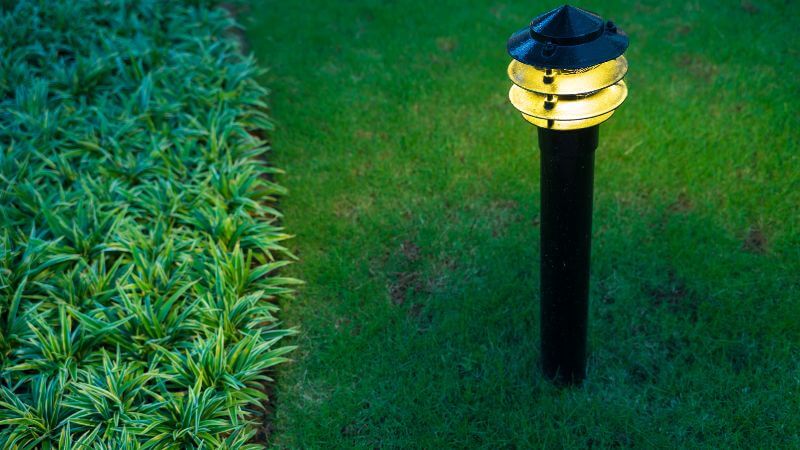
FAQs Solar and Wired Landscape Lighting
Which Is More Cost-Effective: Solar or Electric Lighting?
Alright I hate to admit it but those solar landscape lights have truly come a long way!
Whether solar or wired landscape lighting is more cost-effective to run depends more than anything on the initial installation and ongoing expenses. Though solar exterior lights are more expensive initially, they have no ongoing operational energy cost as sunlight is free. In many sunny locales this genre of fixing is a very good value.
Electric lights have a less expensive installation process but require electrical cost for installation. Wired systems require that power to come from the grid, ultimately resulting in a electricity bill each month.
Can Solar Lights Be Used in Shaded Areas?
While solar exterior lights can technically be placed in shaded areas, they may not perform well without direct sunlight. Solar panels need consistent exposure to sunlight to charge their batteries fully. If placed in a heavily shaded area, such as under trees or near tall buildings, it may not receive enough energy during the day to brighten your space properly at night. In these cases, electric lighting is a better option for areas that don’t get much sunlight.
How Reliable Are Solar Lights During Winter Months?
This is like solar landscape lights who will works during winter time but it have a minimum productivity as days are shorter and sunlight intensity restricted. However, that can be further reduced by cloudy days or when the snow is falling, which have batteries that store energy for just this reason, but when the sun is weak though the day they might not hold much charge and give off dull or even short light coverage at night. For the areas that have long winters electric lights will allow lighting to be more consistent year-round.
When to Use Solar and Electric Lights?
Solar out lights are great for gardens, pathways and open yards as they get direct sunlight. The fact that they can be placed almost anywhere — such as in so-called smart cities or other remote locations where installing electrical wires would be difficult — further enhances their flexibility. Place your lights where they get sun most of the day to assure their capability.
Electric lighting is best for anyone that needs dependable and bright glow around driveways, pathway or even part of a home security system. It is better to use the lights in places that need strong lighting or for spaces that do not receive much sunlight.
How Does the Brightness of Solar Lights Compare to Electric Lights?
Electric lights will be brighter than solar external lights. Compared to wired systems, solar fixtures will likely have much lower lumen output. If you need to have high-brightness lighting for really making features in the landscaping or even just so that it provides security light coverage, electric lighting remains the best alternative. Having said that, solar advancements have been helping to produce brighter solar lights and the variety of brightness levels has expanded, making them feasible in many external lighting situations.
Are Solar Lights Easy to Maintain Compared to Electric Lights?
Yes, Solar lights are easier to maintain in comparison to the electric lighting systems. With solar lighting you need to maintain it a bit, clean the solar panels and change the rechargeable batteries after 24-36 month (they are really cheap). Electric light would require more ongoing maintenance such as changing out bulbs, checking wiring to see if the lights are wired tightly and properly connected electrified. Although wired systems are usually more robust, they require proper maintenance for optimal long-term performance.
What Are the Pros and Cons of Solar and Electric Lights?
- Pros of Solar:
- No energy bills
- Easy installation
- Environmentally friendly
- Cons of Solar:
- Dependent on sunlight
- Lower brightness compared to electric options
- Performance can be affected by weather and seasons
- Pros of Electric:
- Consistent and reliable performance
- Brighter light output
- More control with timers, dimmers, and smart systems
- Cons of Electric:
- Higher energy costs
- Requires professional installation
- Limited flexibility in placement due to wiring
Conclusion
The choice between solar lighting and electric lighting for your corridors, gardens, backyard or sewage depends on the requirements, budget and the condition of your property. Solar lights are easy to install, cheap to use and require very little maintenance execute them ideal for areas that get a plenty of sunlight. But they had difficulty with shadows or winter months. While electric lighting offers consistent, bright lights and more control, but involves more of an installation process and higher energy cost in the long-term. Each option has its upsides and downsides, so this one can come down to your lighting preferences and what you need.


